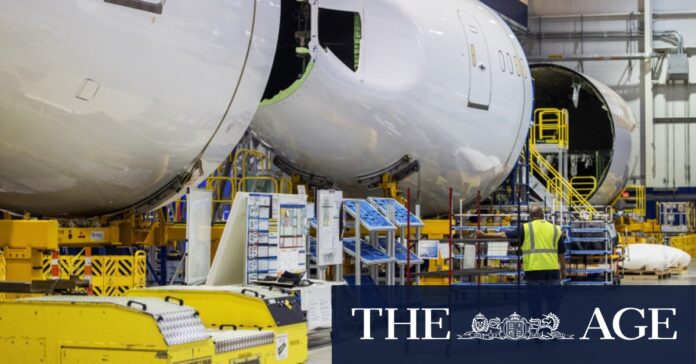[ad_1]
He ticked off a series of actions the company is taking and reported “significant progress” in improving manufacturing quality, much of it by slowing down production, which means fewer planes for its airline customers. Calhoun told CNBC that closer inspections were resulting in 80 per cent fewer flaws in the fuselages coming from key supplier Spirit AeroSystems.
Loading
“Near term, yes, we are in a tough moment,” he wrote to employees. “Lower deliveries can be difficult for our customers and for our financials. But safety and quality must and will come above all else.”
Calhoun, who will step down at the end of the year, said again he is fully confident the company will recover.
Calhoun became CEO in early 2020 as Boeing struggled to recover from the Max crashes, which led regulators to ground the planes worldwide for nearly two years. The company thought it had sidestepped any risk of criminal prosecution when the US Justice Department agreed not to try the company for fraud if it complied with US anti-fraud laws for three years — a period that ended in January.
Boeing has been reaching confidential settlements with the families of passengers who died, but the relatives of those killed in the Ethiopia crash are continuing to press the Justice Department to prosecute the company. On Wednesday, department officials told relatives that the agency was still considering the matter.
It was an emotional meeting, according to Nadia Milleron, whose daughter Samya Stumo died in the 2019 crash.
“People are angry. People are shouting. People are starting to talk over other people,” said Milleron, who watched online from her home in Massachusetts while her husband attended in person. Relatives believe the Justice Department is “overlooking a mountain of evidence against Boeing. It’s mystifying,” she said.
According to Milleron, the head of the fraud section of the Justice Department’s criminal division, Glenn Leon, said his agency could extend its review beyond this summer, seek a trial against Boeing on the charge of defrauding regulators who approved the Max, or ask a judge to dismiss the charge. She said Leon made no commitments.
The Justice Department declined to comment.
A federal judge and an appeals court ruled last year that they had no power to overturn the Boeing settlement. Families of the crash victims hoped the government would reconsider prosecuting Boeing after the January 5 door-plug blowout on the Alaska Airlines jetliner as the plane flew above Oregon.
Investigators looking into the Alaska flight say bolts that help keep the door plug in place were missing after repair work at a Boeing factory. The FBI told passengers that they might be crime victims.
Boeing stock has plunged by about one-third since the blowout. The Federal Aviation Administration has stepped up its oversight and given Boeing until late May to produce a plan to fix problems in manufacturing 737 Max jets. Airline customers are unhappy about not getting all the new planes that they had ordered because of delivery disruptions.
Several former and one current manager have reported various problems in manufacturing of Boeing 737 and 787 jetliners. The most recent, a quality engineer, told Congress last week that Boeing is taking manufacturing shortcuts that could eventually cause 787 Dreamliners to break apart. Boeing pushed back aggressively against his claims.
Boeing, however, has a couple of things in its favour.
Loading
Along with Airbus, Boeing forms one-half of a duopoly that dominates the manufacturing of large passenger planes. Both companies have years-long backlogs of orders from airlines eager for new, more fuel-efficient planes. And Boeing is a major defence contractor for the Pentagon and governments around the world.
Richard Aboulafia, a longtime industry analyst and consultant at AeroDynamic Advisory, said despite all the setbacks Boeing still has a powerful mix of products in high demand, technology and people.
“Even if they are No. 2 and have major issues, they are still in a very strong market and an industry that has very high barriers to entry,” he said.
And despite massive losses — about $US24 billion in the last five years — the company is not at risk of failing, Aboulafia said.
“This isn’t General Motors in 2008 or Lockheed in 1971,” Aboulafia said, referring to two iconic US corporations that needed massive government bailouts or loan guarantees to survive.
All of those factors help explain why 20 analysts in a FactSet survey rate Boeing shares as “Buy” or “Overweight” and only two have “Sell” ratings. (Five have “Hold” ratings.)
Read more:
[ad_2]
Source link



